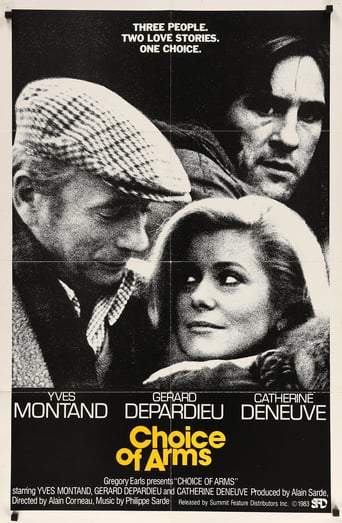Caleb Whitney
... in France, of all places. Believe it or not, they actually showed this film on movie night in St. Martin de Re in southern France. I spent a few months there back in '83 as a temporary guest after an altercation with my book maker. First of all, Catherine DeNeuve is delicious in this film, as always. Depardieu is superb, playing Mickey Le Dingue with a subtle touch that none of us were expecting. Guards and inmates alike, we cried at the sad parts and cheered on the criminals at the crime parts. French prisons have gotten a lot of bad publicity of late due to the high suicide rate and the beatings or murders by the guards, and the knife attacks, and that's all true, but underneath the squalor and brutality and physical horror, there's beauty and art, and film and Mickey Le Dingue and Miss Deneuve. It was worth going to prison to see this movie.
Bob Taylor
With Melville's death, Tavernier and Corneau became the masters of French film noir, but the latter has the dreamlike mood that the genre really needs to be effective. Le choix des armes has many effective scenes (usually involving either Depardieu or Lanvin) but sometimes leaves us cold. There is a little too much exposition in the storytelling--why show us Montand and his buddy smashing up the gang lord's opulent house when there is no dramatic effect to be gained? Or the elaborate four-way car pursuit (did the budget allow for all those stunt-drivers, so Corneau thought Why not?).The acting is mostly exceptional. The young Gérard Lanvin gives us a very frustrated young detective, Michel Galabru is his burnt-out superior, Richard Anconina plays a man trying to settle down to happy domesticity and failing, and Depardieu is simply great as Mickey le dingue, crazy and moving at the same time. The woman who plays Dany's wife with burning resentment takes over every scene she's in.
writers_reign
.. of superlatives. This, the last of the three polars that Corneau made top-billing Montand, finds Montand retired from the mob and roughing it with Catherine Deneuve in a large country chateau where they breed thoroughbreds. Such an idyll can't last, natch, so, before you can say 'make my day, punk', enter Depardieu, hothead extaordinaire, on the lam and looking for a soft touch. Eventually we need the obligatory scene in which the ageing gunfighter dusts off the old six-shooter and wastes the wannabee new fastest gun, except, of course, that this isn't a Western but a very sophisticated and hugely enjoyable polar.It doesn't get any better than Montand and Depardieu (who had worked together earlier in Claude Sautet's 'Vincent, Paul, Francois et les autres' and would do so again in 'Jean de Florette') and with Corneau on bullhorn what's not to like. Post-war French policiers/polars are in a class of their own and provided your nose is in good working order the whiff of cordite can be identified at once as generated by Jean Pierre Melville, Alain Corneau, Tavernier, etc. This one is right out of the top drawer and would BE a top drawer on any screen it graced. Go see! Enjoy!
patrice vatan
On the basis of a very traditional diagram, almost austere in its banality, Michel Grisolia, the scenario writer, gave his realizer a springboard from which this last built a true psychological drama, rich of subtle nuances and learnedly worked drafts. The police aspect interests less Corneau than the painting of the underworld, than the denunciation of the police methods or than the purulent proletarian company of today. The setting in scene is fantastic and remarkable is interpretation (Depardieu!), let us announce however a light Manicheism and certain doubtful psychological analyses.



